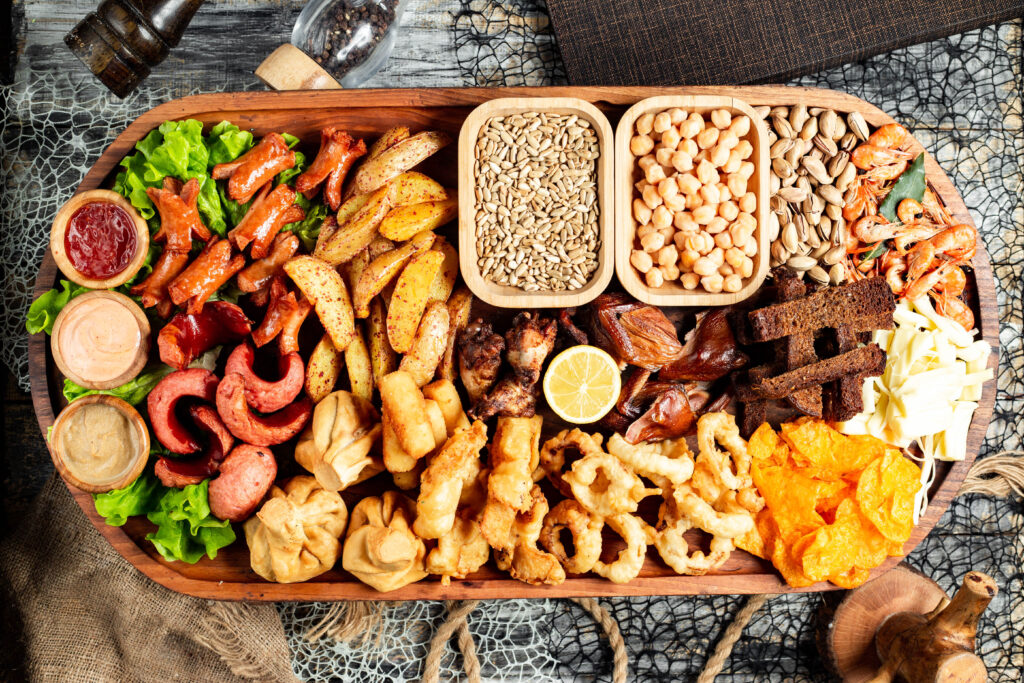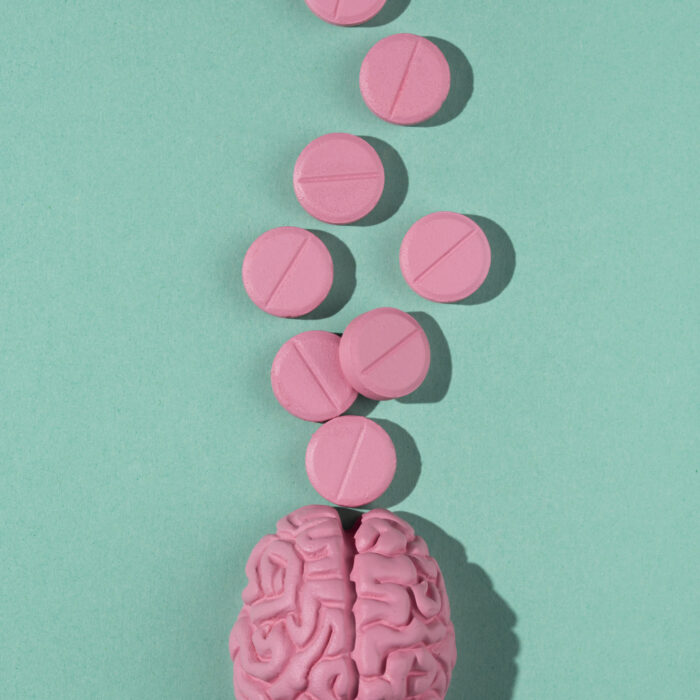Welcome to our comprehensive guide on ultra-processed foods and the health risks associated with them. In today’s fast-paced world, convenience often takes precedence over nutrition, leading many of us to rely on ultra-processed foods as a quick and easy solution. However, this convenience comes at a cost.

Ultra-processed foods, which include packaged snacks, sugary beverages, and ready-to-eat meals, are typically high in added sugars, unhealthy fats, and artificial additives. Regular consumption of these foods has been linked to a range of health issues, including chronic diseases, mental health disorders, and weight gain.
In this guide, we will provide you with a comprehensive overview of ultra-processed food and its associated health risks. We will explore the hidden dangers of additives and preservatives commonly found in these foods, discuss their impact on mental health and weight gain, and offer practical tips for making healthier choices while shopping and cooking.
By the end of this guide, you will have a better understanding of the risks posed by ultra-processed foods and be equipped with the knowledge and strategies to protect your well-being. Let’s dive in!
Key Takeaways:
- Ultra-processed foods are convenient but come with health risks
- Regular consumption of ultra-processed foods is linked to chronic diseases
- Ultra-processed foods can negatively impact mental health and well-being
- These foods contribute to weight gain and obesity
- Additives and preservatives in ultra-processed foods can be harmful
Understanding Ultra-Processed Foods
Ultra-processed foods have become a ubiquitous and concerning part of our modern diets. To truly comprehend the risks associated with these food products, it’s essential to understand their definition and how they differ from regular processed foods.
Ultra-processed food can be defined as food products that undergo extensive processing, typically involving multiple industrial processes and the addition of numerous artificial ingredients. These foods are often high in added sugars, unhealthy fats, and various synthetic chemicals.
While many of us are familiar with the concept of processed foods, it’s important to note that ultra-processed foods go beyond the standard level of processing. Regular processed foods encompass a range of products that have undergone some form of alteration during manufacturing, such as cooking, freezing, or packaging. Ultra-processed foods, on the other hand, undergo extensive industrial processing and contain a multitude of additives and artificial ingredients.
So, what exactly constitutes an ultra-processed food? Examples include packaged snacks, sugary cereals, ready-to-eat meals, fast food items, carbonated drinks, and pre-packaged desserts. You’ll often find these products in brightly colored packaging, designed to catch your attention and create a sense of convenience and indulgence.
“Ultra-processed foods undergoing several transformations and containing numerous additives, show a clear distinction from minimally processed or unprocessed foods. These highly palatable and easily accessible products have become a staple in the modern diet, contributing to the rising rates of chronic diseases.”
So why have ultra-processed foods gained such prevalence in our diets? Several factors contribute to their popularity, including their affordability, convenience, and addictive qualities. The food industry has capitalized on these traits to meet the demands of our fast-paced lifestyles. Unfortunately, the convenience of these foods comes at a significant cost to our health and well-being.
To fully grasp the risks associated with ultra-processed foods, it is crucial to understand their definition and distinguishing features. This knowledge forms the foundation for our comprehensive guide, which aims to help you navigate the dangers of ultra-processed foods and restore the importance of wholesome, nourishing meals in your life.
| Processed Food | Ultra-Processed Food |
|---|---|
| Undergoes some level of alteration during manufacturing | Undergoes extensive industrial processing |
| May contain additives and artificial ingredients | Contains a multitude of additives and artificial ingredients |
| Examples: frozen vegetables, canned fruits, pasteurized milk | Examples: packaged snacks, sugary cereals, fast food items |
The Link Between Ultra-Processed Foods and Chronic Diseases
Research has shed light on the concerning connection between the consumption of ultra-processed food and the development of chronic diseases. Chronic diseases such as heart disease, obesity, and diabetes have been closely linked to the regular intake of these unhealthy food choices.
Ultra-processed foods are often packed with harmful ingredients and additives that contribute to these health risks. High levels of added sugars, unhealthy fats, and sodium, along with artificial flavors and preservatives, are commonly found in these highly processed food products.
The excessive consumption of these unhealthy ingredients can lead to a range of chronic conditions that significantly impact individuals’ well-being. Heart disease, for example, is a leading cause of death globally, and studies have shown that the consumption of ultra-processed food increases the risk of developing this condition.
“The excessive consumption of ultra-processed foods significantly increases the risk of developing chronic diseases, including heart disease, obesity, and diabetes.”
Obesity, another major concern, has reached epidemic proportions worldwide. Ultra-processed foods often have a high calorie density and are lacking in essential nutrients, which can contribute to weight gain and obesity. The excess consumption of these calorie-dense foods, combined with a sedentary lifestyle, can increase the risk of obesity and its associated health complications.
Diabetes, particularly type 2 diabetes, is another chronic disease that is heavily influenced by lifestyle factors, including diet. Studies have found a clear association between the consumption of ultra-processed food and an increased risk of developing type 2 diabetes. The high levels of added sugars and unhealthy fats in these foods can disrupt insulin sensitivity and lead to elevated blood sugar levels over time.
The evidence linking ultra-processed food consumption to chronic diseases underscores the importance of making informed dietary choices. By reducing the intake of these unhealthy food options and prioritizing whole, unprocessed foods, individuals can significantly lower their risk of developing heart disease, obesity, and diabetes.
Taking steps to improve the quality of one’s diet and prioritize health-promoting foods is crucial in preventing these chronic diseases and maintaining overall well-being.
Impact of Ultra-Processed Foods on Mental Health and Well-being
A growing body of research has uncovered a concerning link between consuming ultra-processed food and mental health disorders. Studies have found that individuals who regularly consume these types of foods have a higher incidence of depression, anxiety, and increased stress levels.
But how exactly does ultra-processed food impact our mental well-being? One possible explanation lies in the nutrient deficiencies commonly associated with these foods. Ultra-processed foods are often stripped of essential nutrients during processing, leading to imbalances in our body and brain chemistry.
Furthermore, the additives and artificial ingredients found in ultra-processed foods may contribute to mood disturbances. These additives, such as artificial colors, flavors, and preservatives, have been linked to increased hyperactivity, irritability, and other behavioral changes.
In a society already grappling with the burdens of modern-day stressors, the consumption of ultra-processed food appears to exacerbate these issues. The prevalence of convenience foods, loaded with unhealthy ingredients, has made it increasingly challenging to maintain a balanced and nourishing diet.
Thankfully, recognizing the impact of ultra-processed food on mental health allows us to take steps towards prioritizing our well-being. By opting for whole, minimally processed foods, we can nourish our bodies and provide the necessary nutrients for optimal brain function.
Breaking Free from the Cycle
It’s important to remember that our dietary choices can significantly influence our mental health. By reducing our consumption of ultra-processed food and adopting a diet rich in fruits, vegetables, whole grains, lean proteins, and healthy fats, we can support our overall well-being.
Choosing nutrient-dense foods and avoiding ultra-processed options is a powerful way to nourish our bodies and promote mental wellness. – Dr. Jessica Bennett, Registered Dietitian
In addition to nutritious eating, other lifestyle factors such as regular exercise, stress management techniques, and quality sleep can also contribute to improved mental health. By taking a holistic approach that addresses both physical and mental well-being, we can enhance our resilience and minimize the risks associated with consuming ultra-processed food.
Ultra-Processed Food and Weight Gain
When it comes to weight management, the role of ultra-processed food cannot be ignored. The high calorie density and low nutrient content of these foods create a perfect storm for weight gain and obesity. Let’s delve deeper into how these factors contribute to unwanted pounds and explore ways to promote healthier eating habits.
The Calorie Density Trap of Ultra-Processed Foods
Ultra-processed foods are often packed with calories thanks to their high sugar, fat, and artificial additives content. These calorie-dense foods can lead to overeating as they don’t provide the same satiety and nutritional value compared to whole, unprocessed foods. Consuming calorie-dense foods without a proper balance of nutrients can easily tip the scales towards weight gain.
Take a look at this table for a comparison of calorie density between ultra-processed foods and healthier alternatives:
| Food | Calories per 100g |
|---|---|
| Ultra-processed fast food burger | 250 |
| Homemade grilled chicken breast | 165 |
| Ultra-processed potato chips | 536 |
| Handful of mixed nuts | 607 |
As you can see, ultra-processed food options tend to carry a higher calorie load, making it easy to exceed daily calorie needs and contribute to weight gain.
Promoting Healthier Eating Habits
Fortunately, managing weight doesn’t have to be an uphill battle. By making conscious choices and prioritizing nutrient-dense foods, you can control weight gain and promote overall well-being. Here are a few tips:
- Opt for whole, unprocessed foods such as fruits, vegetables, lean proteins, and whole grains.
- Pay attention to portion sizes and practice mindful eating to avoid overindulging in calorie-dense foods.
- Keep track of your daily calorie intake and make adjustments as needed to maintain a healthy weight.
- Incorporate regular physical activity into your routine to burn calories and support weight management.
“By choosing whole, nutrient-dense foods and adopting mindful eating habits, we can move away from the damaging cycle of weight gain associated with ultra-processed foods.” – Dr. Emily Roberts, Nutrition Expert
It’s important to remember that achieving and maintaining a healthy weight is a long-term journey that requires consistency and moderation. By being aware of the calorie density of ultra-processed foods and prioritizing healthier options, you can take control of your weight and improve your overall health.
Hidden Dangers of Ultra-Processed Foods: Additives and Preservatives
In the realm of ultra-processed foods, a lurking menace often goes unnoticed: additives and preservatives. These seemingly innocuous ingredients can pose significant health risks when consumed in excessive amounts. Let’s shed light on the potential dangers they present and explore ways to identify and sidestep foods with an overabundance of these additives.
The Health Risks of Additives and Preservatives
Additives and preservatives are commonly used in processed and ultra-processed foods to enhance flavor, texture, and shelf life. While some additives are safe for consumption, others can have adverse effects on our health. Here are a few potential health risks associated with these ingredients:
- Allergic Reactions: Certain additives, such as artificial colorings and flavorings, may trigger allergies or intolerances in individuals.
- Increased Health Risks: Some additives, like artificial sweeteners and high fructose corn syrup, have been linked to the development of chronic diseases such as diabetes and obesity.
- Disruption of Gut Health: Certain preservatives, such as sodium nitrite and sodium benzoate, may disrupt the natural balance of gut bacteria, affecting digestion and overall gut health.
These are just a few examples of the potential health risks associated with additives and preservatives. It’s important for consumers to be aware of these risks and make informed choices when it comes to their food consumption.
Identifying and Avoiding Excessive Additives and Preservatives
Now that we understand the risks, how can we avoid these hidden dangers in our food? Here are some tips to help you identify and minimize your exposure to excessive additives and preservatives:
- Read Labels: Take the time to read ingredient labels carefully. Look for unfamiliar or unpronounceable additives and preservatives. Opt for products with minimal or no added ingredients.
- Choose Whole Foods: Focus on consuming whole foods such as fruits, vegetables, lean meats, and whole grains. These natural, unprocessed options are free from artificial additives and preservatives.
- Cook from Scratch: By preparing meals at home from scratch, you have control over the ingredients you use. This allows you to avoid unnecessary additives and preservatives.
“Understanding the potential health risks of additives and preservatives is crucial for making informed choices about the foods we consume.”
| Additive Type | Examples | Potential Health Risks |
|---|---|---|
| Artificial Colorings | Tartrazine, Allura Red | Allergic reactions, hyperactivity in children |
| Artificial Sweeteners | Aspartame, Saccharin | Increased risk of obesity, metabolic disorders |
| Preservatives | BHA, BHT | Potential disruption of gut bacteria, allergic reactions |
Table: Examples of Common Additives and Preservatives and Their Potential Health Risks
Navigating Ultra-Processed Foods at the Grocery Store
When it comes to grocery shopping, making healthier choices can sometimes feel like a daunting task. With so many options lining the aisles, it’s easy to get overwhelmed. However, with a few simple strategies, you can navigate the grocery store with confidence and avoid ultra-processed foods that can negatively impact your health.
One of the first steps in healthy shopping is learning to read food labels. Take a moment to examine the ingredient list and look out for red flags such as added sugars, artificial flavors, and preservatives. Opt for products with shorter ingredient lists that contain recognizable whole foods. Keep an eye out for keywords like “whole grain” and “natural.” This will help you identify foods that are less processed and more nutritious.
Another tip for avoiding ultra-processed foods is to shop primarily along the perimeter of the store. This is where you’ll find fresh produce, lean proteins, and dairy products. These whole foods are less likely to be heavily processed and contain fewer additives. Remember, the middle aisles of the store tend to be filled with packaged snacks, sugary cereals, and processed foods. By sticking to the perimeter, you’ll be making healthier choices without even realizing it.
“By learning to read food labels and shopping primarily along the perimeter of the store, you can make informed choices and avoid ultra-processed foods.” – Dr. Emma Johnson, Nutrition Expert
If you’re looking for alternatives to ultra-processed foods, consider exploring the bulk section of your grocery store. Here, you can find a variety of whole grains, nuts, and seeds that can be purchased in bulk. This allows you to control the quantity you purchase and reduces unnecessary packaging. Additionally, consider swapping out processed snacks like chips and cookies for fresh fruits, vegetables, and homemade alternatives. Not only are these options healthier, but they can also be more cost-effective in the long run.
To help you visualize the key tips for healthy shopping, here’s a handy table summarizing the strategies discussed above:
| Tips for Healthy Shopping |
|---|
| Read food labels and avoid added sugars, artificial flavors, and preservatives |
| Shop along the perimeter of the store for fresh produce, lean proteins, and dairy products |
| Explore the bulk section for whole grains, nuts, and seeds |
| Swap out processed snacks for fresh fruits, vegetables, and homemade alternatives |
By following these tips and adopting a mindful approach to grocery shopping, you can make healthier choices and avoid the pitfalls of ultra-processed foods. Remember, every small step towards a more balanced and nutritious diet is a step towards a healthier future.
Cooking and Meal Preparation to Minimize Ultra-Processed Foods Intake
When it comes to protecting your well-being and ensuring a healthy diet, home cooking and meal preparation play a crucial role. By taking control of the ingredients you use and the cooking methods you employ, you can minimize your reliance on ultra-processed food and instead focus on cooking from scratch with whole, unprocessed ingredients.
Here are some time-saving tips, recipe ideas, and suggestions to help you incorporate home cooking into your daily routine:
- Create a meal plan: Plan your meals for the week ahead to avoid impulsive and unhealthy food choices.
- Prep ingredients in advance: Spend some time on the weekend or during the week prepping ingredients like chopping vegetables or marinating meats to save time during busy weekdays.
- Batch cook: Prepare large quantities of meals and freeze them in individual portions for easy and quick meals on busy days.
- Experiment with flavors: Cooking from scratch allows you to explore different flavors and experiment with herbs, spices, and seasonings to enhance the taste of your dishes.
- Stock up on pantry essentials: Maintain a well-stocked pantry with basic staples like grains, legumes, oils, and spices, so you always have the foundation for a nutritious homemade meal.
- Try new recipes: Explore cookbooks, online blogs, and cooking channels for inspiration and new recipe ideas to keep your meals interesting and enjoyable.
By prioritizing home cooking and meal preparation, you can have better control over your food choices, ensure the use of high-quality ingredients, and create meals that are both nutritious and delicious.
“Cooking is like love. It should be entered into with abandon or not at all.” – Harriet Van Horne
To illustrate the benefits of home cooking, let’s take a look at the following table that compares the nutritional value of a homemade meal and a typical ultra-processed fast-food meal:
| Homemade Meal | Ultra-Processed Fast-Food Meal | |
|---|---|---|
| Calories | 400 | 800 |
| Added Sugars | 0g | 20g |
| Sodium | 400mg | 1000mg |
| Fiber | 5g | 1g |
| Healthy Fats | 10g | 20g |
This comparison highlights the significant differences in nutritional value between a homemade meal and an ultra-processed fast-food meal. By cooking from scratch, you have the power to prioritize nourishing ingredients and create meals that support your health and well-being.
Recognizing and Overcoming Ultra-Processed Foods Addiction
Food addiction can be a challenging cycle to break. The addictive nature of ultra-processed foods can trigger cravings and lead to a cycle of dependence. However, with the right strategies, it is possible to overcome these cravings and regain control over your eating habits.
The Psychological and Physiological Factors Behind Cravings
Understanding the psychological and physiological factors behind cravings is essential for overcoming food addiction. Ultra-processed foods are often designed to be hyper-palatable, stimulating pleasure centers in the brain and creating a desire for more. Additionally, these foods can disrupt our body’s natural hunger and fullness signals, leading to increased cravings and overeating.
Breaking the Cycle of Dependence
Breaking the cycle of ultra-processed food addiction requires a multifaceted approach. Here are some expert tips to help you overcome cravings and regain control:
- Create Awareness: Start by recognizing your triggers and identifying the specific ultra-processed foods that you find yourself craving. Awareness is the first step towards breaking free from the cycle of dependence.
- Build a Support System: Surround yourself with a supportive network of friends, family, or a support group who understand your goals and can provide encouragement and accountability.
- Replace with Healthier Alternatives: Find healthier alternatives to satisfy your cravings. Experiment with nutrient-dense whole foods that provide similar flavors or textures to the ultra-processed foods you crave.
- Practice Mindful Eating: Slow down and engage all your senses while eating. Pay attention to the flavors, textures, and smells of your food. This can help you fully enjoy your meals and reduce the desire for processed foods.
- Manage Stress and Emotions: Find healthy ways to cope with stress and emotional triggers that may lead to cravings. Engage in activities such as exercise, meditation, or talking to a professional therapist.
Expert Insights: Breaking Free from Food Addiction
“Breaking free from food addiction requires a combination of self-awareness, support, and healthy coping strategies. By understanding the psychological and physiological factors behind cravings and implementing strategies to overcome them, individuals can regain control over their eating habits and live a healthier, more fulfilling life.” – Dr. Maria Rodriguez, Nutrition Specialist
Ultra-Processed Food Alternatives
| Ultra-Processed Foods to Avoid | Healthier Alternatives |
|---|---|
| Soda | Infused water with fruits and herbs |
| Packaged Cookies | Oatmeal cookies made with whole-grain flour and natural sweeteners |
| Chips | Baked vegetable chips or air-popped popcorn |
| Processed Lunch Meat | Grilled chicken or turkey breast slices |
| Instant Noodles | Homemade veggie-packed noodle bowls with whole-grain noodles |
Table: Comparison of ultra-processed foods to healthier alternatives.
By recognizing the addictive nature of ultra-processed food, understanding cravings, and implementing strategies to break the cycle, individuals can overcome food addiction and make healthier choices for their overall well-being.
Conclusion
In conclusion, it is crucial to be aware of the risks associated with consuming ultra-processed food. The evidence presented in this comprehensive guide underscores the detrimental effects these foods can have on our health. From the link between ultra-processed food and chronic diseases like heart disease, obesity, and diabetes to the impact on mental health and weight gain, the dangers are clear.
To safeguard our well-being, it is essential to make informed choices. By prioritizing whole, nutritious foods, we can nourish our bodies and reduce the negative impact of ultra-processed food. Ensuring a balanced diet rich in fresh fruits, vegetables, lean proteins, and whole grains is key to a healthier lifestyle.
Remember, small changes can make a big difference. Avoiding ultra-processed food as much as possible, reading labels carefully, and cooking meals from scratch are simple steps we can take. By recognizing and overcoming food addiction and breaking the cycle of dependence, we can regain control over our eating habits and improve our overall well-being.
It’s time to prioritize our health. Let’s choose wholesome options and embrace a lifestyle that nourishes our bodies, minds, and spirits. Together, we can pave the way to a healthier future.
FAQ
What is ultra-processed foods?
Ultra-processed food refers to food products that undergo multiple industrial processes, often containing additives, preservatives, and artificial ingredients. These foods are typically highly processed and offer little nutritional value.
How does ultra-processed foods differ from regular processed food?
While both types of food undergo processing, ultra-processed food typically undergoes more extensive processing, resulting in a higher content of additives, preservatives, and artificial ingredients. Regular processed food, on the other hand, may undergo some processing but still retains some original nutritional qualities.
What are the health risks associated with consuming ultra-processed food?
Consuming ultra-processed food has been linked to an increased risk of chronic diseases such as heart disease, obesity, and diabetes. These foods often contain high levels of unhealthy fats, sugars, and sodium, which can contribute to these health risks.
Can ultra-processed food affect mental health?
Yes, studies suggest a potential link between consuming ultra-processed food and an increased risk of mental health disorders such as depression, anxiety, and heightened stress levels. Nutrient deficiencies in these foods may also play a role in these associations.
Does eating ultra-processed food contribute to weight gain?
Yes, consuming ultra-processed food can contribute to weight gain and obesity. These foods are often calorie-dense but lack essential nutrients, leading to overeating and imbalanced diets.
Are there any hidden dangers in ultra-processed food?
Yes, additives and preservatives commonly found in ultra-processed food can pose health risks. Excessive consumption of these ingredients has been linked to various health issues, including allergic reactions and adverse effects on overall well-being.
How can I make healthier choices while grocery shopping?
When grocery shopping, read food labels carefully, avoid products with excessive additives and preservatives, and opt for whole, unprocessed ingredients. Choosing fresh fruits, vegetables, lean proteins, and whole grains can help promote a healthier diet.
Is home cooking a better alternative to consuming ultra-processed food?
Yes, cooking meals at home using whole ingredients is a great way to minimize reliance on ultra-processed food. By cooking from scratch, you can control the ingredients and ensure a higher nutritional value in your meals.
How can I overcome food addiction to ultra-processed food?
Recognizing triggers and understanding the psychological and physiological factors behind cravings is the first step. Breaking the cycle of food addiction involves seeking professional help, practicing mindful eating, and gradually replacing ultra-processed food with healthier alternatives.
What are the key takeaways from this article?
The key takeaways are to be aware of the health risks associated with consuming ultra-processed food, prioritize whole, nutritious foods, and make informed choices while grocery shopping. Cooking at home and overcoming food addiction are also essential for better overall well-being.
for more informations click here
for more articles click here






